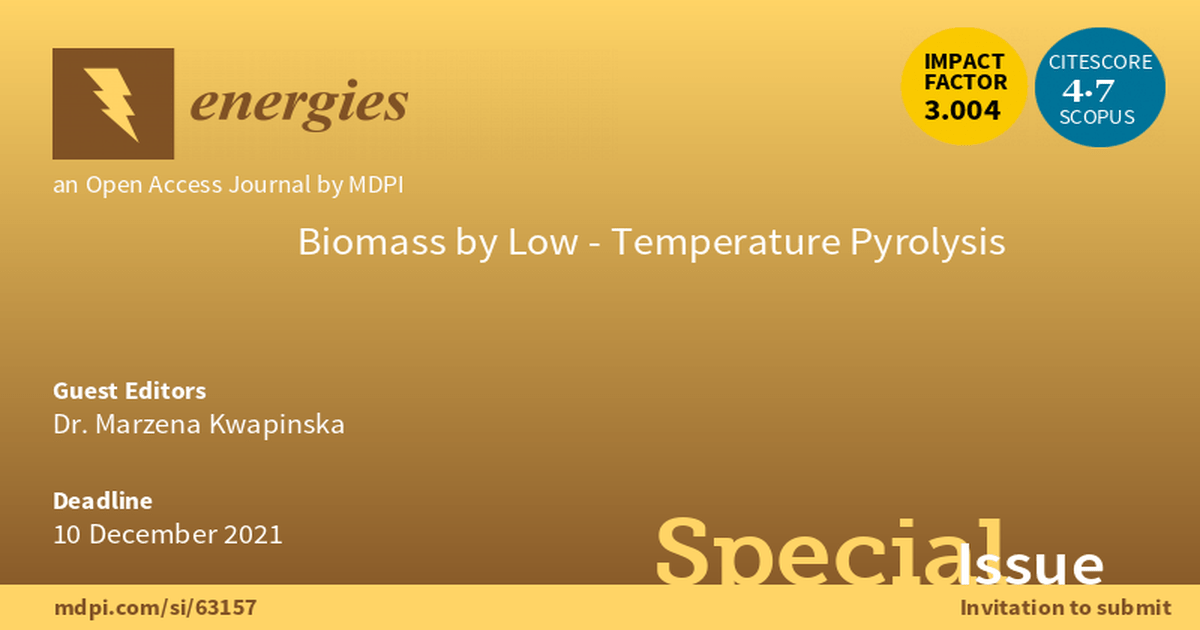Biomass by Low-Temperature Pyrolysis
A special issue of Energies (ISSN 1996-1073). This special issue belongs to the section "A4: Bio-Energy".
Deadline for manuscript submissions: closed (10 December 2021) | Viewed by 10475

Special Issue Editors
Interests: Process engineering; chemical reaction engineering; renewable energy technologies; energy engineering; thermal engineering; modeling and simulation; pyrolysis, gasification, torrefaction, biomass conversion, materials
Interests: low-carbon energy conversion processes and hydrogen production; resource recovery from agri-waste; decarbonising heat and energy systems; gasification; pyrolysis; combustion; fluidised bed conversion; sustainability
Special Issue Information
Dear Colleagues,
Biomass is one of the largest and most sustainable energy sources, yet in many countries and regions of the world, it has not been utilized well. Bioenergy recovery has become one of the key strategies due to the increasing shortage of fossil fuels and serious deterioration of ecological environments. A variety of lignocellulosic biomass types, including woody biomass, dedicated energy crops, agricultural residues and forestry residues, are often region-specific. Moreover, it is expected to produce more renewable energy by reutilization of biowaste. Processing of biomass in its natural form for energetic purposes by direct combustion with immediate heat utilization has very low efficiency. Thus, a full utilization of renewable energy sources and practical application of recycled bioenergy is still under exploration. Pyrolysis of biomass (not only lignocellulosic, but also biowaste), on one hand, has potential to provide fuels that are easier to store or with higher energy density (char, bio-oil and syngas), while on the other hand, it can facilitate the production of value-added chemicals (e.g., furfural, etc.).
This Special Issue aims at exploring the most recent advances in biomass (including biowaste) low-temperature pyrolysis to bioenergy, biobased chemicals, and carbon-rich materials, including the application of such products (e.g., biochar for soil amendment, as an adsorptive media or a catalyst) as well as recent developments in kinetic, thermodynamic and numerical modeling of pyrolysis processes.
Submit your paper and select the Journal “Energies” and the Special Issue “Biomass by Low-Temperature Pyrolysis” via: MDPI submission system. Please contact the special issue editor (spring.deng@mdpi.com) for any queries. Our papers will be published on a rolling basis and we will be pleased to receive your submission once you have finished it.
Dr. Marzena Kwapinska
Dr. Daya Pandey
Guest Editors
Manuscript Submission Information
Manuscripts should be submitted online at www.mdpi.com by registering and logging in to this website. Once you are registered, click here to go to the submission form. Manuscripts can be submitted until the deadline. All submissions that pass pre-check are peer-reviewed. Accepted papers will be published continuously in the journal (as soon as accepted) and will be listed together on the special issue website. Research articles, review articles as well as short communications are invited. For planned papers, a title and short abstract (about 250 words) can be sent to the Editorial Office for assessment.
Submitted manuscripts should not have been published previously, nor be under consideration for publication elsewhere (except conference proceedings papers). All manuscripts are thoroughly refereed through a single-blind peer-review process. A guide for authors and other relevant information for submission of manuscripts is available on the Instructions for Authors page. Energies is an international peer-reviewed open access semimonthly journal published by MDPI.
Please visit the Instructions for Authors page before submitting a manuscript. The Article Processing Charge (APC) for publication in this open access journal is 2600 CHF (Swiss Francs). Submitted papers should be well formatted and use good English. Authors may use MDPI's English editing service prior to publication or during author revisions.
Keywords
- Feedstock (woody biomass, energy crops, seaweed, animal waste, etc.)
- Bioenergy
- Biofuels
- Biobased chemicals
- Bio-oil
- Biochar
- Biochar-based catalyst
- Syngas
- Low-temperature pyrolysis
- Lignocellulosic
- Pyrogenic carbon-rich material
Benefits of Publishing in a Special Issue
- Ease of navigation: Grouping papers by topic helps scholars navigate broad scope journals more efficiently.
- Greater discoverability: Special Issues support the reach and impact of scientific research. Articles in Special Issues are more discoverable and cited more frequently.
- Expansion of research network: Special Issues facilitate connections among authors, fostering scientific collaborations.
- External promotion: Articles in Special Issues are often promoted through the journal's social media, increasing their visibility.
- Reprint: MDPI Books provides the opportunity to republish successful Special Issues in book format, both online and in print.
Further information on MDPI's Special Issue policies can be found here.






